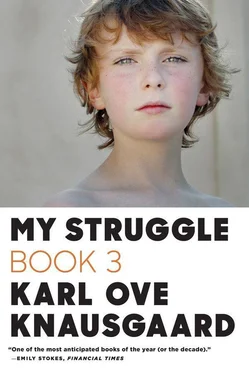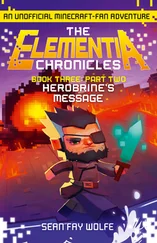I felt my chest tighten with despair.
“Ye-es. All my life. Didn’t you know?”
“No! Why didn’t you say?”
Tears were running down my cheeks.
“But, darling,” Mom said, “I didn’t think it mattered. Sissel is the name I use. Norunn is just a middle name. A kind of extra name.”
I was shaken to the core. Not by the name in itself, but by the fact that I hadn’t known it. That she’d had a name I didn’t know.
Was there anything else I didn’t know?
A month later, in the middle of the long summer holiday, we drove up to Sørbøvåg by Åfjorden in Ytre Sogn, where my mother’s parents lived, and we stayed there for two weeks. I had been looking forward to this so much that on the morning we were due to leave and I was woken at the crack of dawn, there was a tinge of unreality about it. The trunk was packed to the gunnels, Mom and Dad sat at the front, Yngve and I in the back, we would be in the car all day and evening, and even the most familiar sight, the road down to the crossroads and up to Tromøya Bridge, seemed cast in a different light. Now it didn’t belong to the house and our existence in it, now it belonged to the great expedition we had set out on, which lent every crag and every rock, every islet and every skerry, excitement and anticipation.
When we came to the crossroads by the bridge I folded my hands as usual and said the short prayer that had worked every time so far:
Dear God,
Please don’t let us crash.
Amen
We drove across the mainland, through vast, monotonous, coniferous forests, past Evje with its long, low military barracks and pine plains, past Byglandsfjord and the campsite, up into Setesdalen, with its age-old enclosed fields and farms and the many silversmith signs, along a road that in some places almost seemed to go through people’s drives. Slowly buildings disappeared, it was as if the houses lost their hold on us and fell by the wayside one by one, like children fell off the enormous inner tube someone had roped to a boat earlier that summer. As the boat’s speed increased only the tube was left. I saw glinting sandbanks along the sides of the river, green-clad hills rising more and more steeply, the occasional enormous, bare mountainside, in every shade of gray, with some flame-red pine trees on top. I saw rapids and waterfalls, lakes and plains, everything bathed in the glow of the clear, bright sun, which, as we drove, had risen higher and higher in the sky. The road was narrow, and it gently and unobtrusively followed all the countryside’s dips and climbs, curves and bends, with trees like a wall on both sides in some places, towering over everything in others, in sudden and unexpected vantage points.
Sporadically, rest areas appeared during the journey, small graveled areas beside the road where families could sit and eat at rough-hewn timber tables, their cars next to them, generally with doors and trunks open, under the shade of trees, often close to a lake or a river. Everyone had a thermos on the table, many had a cooler bag, some also a Primus stove. “Aren’t we going to stop for a break soon?” I would ask after seeing such a rest area because breaks, alongside ferry crossings, belonged to the high points of the journey. We, too, had a cooler bag in the trunk; we, too, had a thermos, juice, and a little pile of plastic glasses, cups, and plates with us. “Don’t pester me,” Dad would say then, desperate to cover as many kilometers as he could in one go. That meant that, at the very least, we would have to drive to the end of Setesdalen, past Hovden and Haukeligrend and up Mount Haukeli, before the question of a break even came into consideration. Then we would have to find a suitable place because we would not take the first opportunity, oh no: if the stops were few and far between, then the location of the rest area had to be something special.
In the uplands the terrain was completely flat. There wasn’t a tree or a bush to be seen anywhere. The road continued dead straight. Some areas were littered with boulders strewn across the ground, covered with a kind of coating I thought might have been lichen or moss. Others were unbroken rock face, clean, scrubbed. Here and there water sparkled, snow glinted. Dad drove faster as there was such a clear view. At intervals, along the roadside, we saw tall poles, and Yngve said it was quite incredible, they were markers and so high because the snow in winter could reach up to the top. That was several meters!
The sun shone, the mountain plateau stretched in all directions, and we, we were racing ahead. One rest area after another was left in our wake until, without warning, Dad signaled, braked, and pulled in.
It was situated right next to a lake, oval and utterly black. Beyond it the ground rose gently while at the side there was a big snowdrift, bluish in color and hollow underneath where the water disappeared down an opening.
Around us it was perfectly still. After so many hours with the regular hum of the engine the silence felt artificial, as though it didn’t belong to the landscape but to us.
Dad opened the trunk, took out the cooler bag, and put it on the coarse wooden table, where Mom immediately began to unpack it as he fetched the thermos and the bag with the cups and plates. Yngve and I ran to the water, bent down, and dipped a hand. It was freezing cold!
“How about a swim here, boys?” Dad said.
“Oh no, it’s freezing!” I said.
“Sissies,” he said.
“But it’s freeezing!” I said.
“Yes, I’m sure it is. I was only joking. We haven’t time for a swim anyway.”
Yngve and I walked over to the snowdrift. It was so solid we couldn’t make snowballs from it, as we had hoped. And walking across the top, with the water underneath, wouldn’t be in the cards if Mom and Dad were there.
I broke off a clump and threw it into the lake, where it bobbed up and down like a mini iceberg. Now at least, when we were home, I could say we had thrown snowballs in the middle of July.
“Come and eat,” Mom called.
We sat down. We each had a packed lunch. Three slices of bread with boiled egg on top. In addition, there was a package of cookies on the table. In our glasses there was juice. The plastic gave it a different taste, but I liked it, it reminded me of the trips we used to have when we picked berries and went on camping holidays. We hadn’t had that many, there’d been basically only one, last summer when we went to Sweden with Grandma and Grandad. A car raced up from behind me, it was as though the sound vibrated as it increased in volume, then after a kind of boom it went quieter again until it was gone. Steam rose from Mom and Dad’s coffee. A car towing a trailer came from the other direction. I watched it as I finished my juice. It was creeping along. Then it signaled. As it pulled over into the rest area Dad turned.
“What’s that idiot doing?” he said. “There’s only one table here. Can’t he see?”
He turned back, put his coffee cup down, and took the fox-emblazoned pouch of tobacco from his breast pocket.
The car with the trailer stopped only a few meters from us. The door opened and a fat man dressed in a pair of beige shorts and a yellow T-shirt, with a brown bucket hat, emerged. He opened the door of the trailer and disappeared inside as a woman came out of the other car door. She was also fat and wore light-gray elasticized slacks with a crease and a woolen sweater. From her mouth hung an unlit cigarette, her hair was big and gray and yellow, and over her eyes she wore a pair of large glasses with tinted lenses. She went to stand by the lake, lit her cigarette, and gazed across as she smoked.
I started on the last slice of bread.
The man reemerged with a camping table in his hands. He erected it between the car and our table. Dad turned again.
Читать дальше












